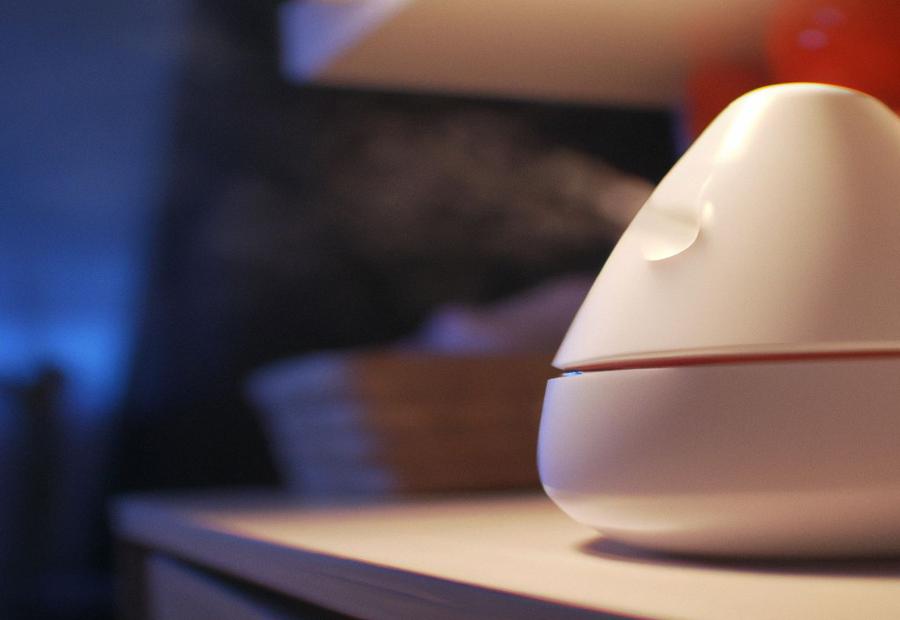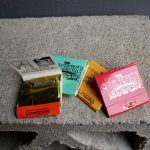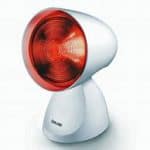Last Updated on 9 months by Francis
.jpg)
A humidifier is an important appliance that helps maintain a comfortable level of humidity in our indoor spaces. However, it can be concerning and unpleasant if your humidifier starts to smell like pee. Understanding the causes behind this issue is essential in order to address it effectively. Several factors can contribute to a humidifier smelling like pee, such as possible contaminants in the water, improper cleaning and maintenance practices, and bacterial growth within the humidifier itself. These factors can lead to health risks, including breathing problems, allergic reactions, and possible infections.
In order to get rid of the unpleasant smell, it is important to thoroughly clean the humidifier, use distilled water, regularly change the water, and consider using natural remedies. Adopting proper preventive measures such as regular cleaning and maintenance, using proper water sources, and controlling humidity levels can help prevent the smell from reoccurring. By understanding the causes, addressing the smell, and implementing preventive measures, you can ensure that your humidifier functions properly and provides a clean and comfortable environment.
Contents
Key takeaway:
- Causes of a humidifier smelling like pee can include possible contaminants in the water, improper cleaning and maintenance, and bacterial growth in the humidifier.
- A humidifier smelling like pee may pose health risks such as breathing problems, allergic reactions, and possible infections.
- To get rid of the smell, thoroughly clean the humidifier, use distilled water, regularly change the water, and consider using natural remedies.
- Tips for preventing the smell include regularly cleaning and maintaining the humidifier, using proper water sources, and controlling the humidity levels.
Causes of a Humidifier Smelling like Pee
Unpleasant odors from your humidifier can be a real head-scratcher. In this section, we’ll uncover the causes behind that pee-like smell coming from your device. From possible contaminants lurking in the water to improper cleaning and maintenance practices, we’ll discuss the factors that may be contributing to the problem. Additionally, we’ll shed light on the potential bacterial growth within your humidifier and its impact on the odor. Get ready to tackle the stink and regain fresh air in your space!
Possible Contaminants in the Water
| Possible Contaminants in the Water |
| 1. Bacteria |
| 2. Mold |
| 3. Algae |
| 4. Mineral deposits |
| 5. Chemicals |
| 6. Sediments |
When it comes to the possible contaminants in the water of a humidifier, there are several types to be aware of. Bacteria, mold, and algae can thrive in the warm and moist environment of a humidifier, leading to unpleasant smells. Mineral deposits, such as calcium and magnesium, can also accumulate in the water, particularly if tap water is used. These deposits can contribute to the odor as well.
Chemicals present in the water, such as chlorine from tap water, can react with other substances in the humidifier, resulting in unpleasant smells. Additionally, sediments and impurities in the water can build up over time, leading to a foul odor.
To prevent these contaminants from causing a smell, it is crucial to regularly clean and maintain the humidifier. Using distilled water instead of tap water can also help reduce the presence of chemicals and mineral deposits. Furthermore, regularly changing the water in the humidifier and using proper water sources can minimize the risk of bacterial and mold growth.
In a true story, a friend of mine had a humidifier that started smelling like pee. After investigating the possible causes, it turned out that the tap water being used had high levels of minerals. Switching to distilled water solved the issue, as it eliminated mineral deposits and the accompanying odor.
Improper Cleaning and Maintenance
Proper cleaning and maintenance are imperative when it comes to a humidifier, as neglecting these practices can lead to an unpleasant odor resembling urine. It is crucial to follow the necessary steps to ensure the efficient and odor-free operation of your humidifier.
- Regularly clean the humidifier: To prevent the accumulation of bacteria, mold, and mineral deposits, it is essential to clean the humidifier on a regular basis. Disassemble the unit and clean all removable parts, including the water tank and filter, using a mild detergent or vinegar solution. Thoroughly rinse and allow them to dry before reassembling.
- Monitor and replace the filter: Over time, the filter in your humidifier can become dirty and clogged, resulting in a foul odor. Consult the manufacturer’s instructions for the appropriate filter replacement schedule and replace it accordingly.
- Empty and refill the water tank daily: Stagnant water in the tank promotes bacterial growth and contributes to the unpleasant smell. To counteract this, empty the tank, thoroughly rinse it, and refill it with fresh water on a daily basis.
- Use distilled or demineralized water: Tap water contains minerals that can accumulate in the humidifier, leading to unpleasant odors. Opting for distilled or demineralized water can help prevent mineral build-up and minimize the smell.
- Avoid over-humidification: Excessive moisture in the air creates a breeding ground for bacteria and can contribute to the unpleasant odor. Monitor the humidity levels in the room and adjust the humidifier settings accordingly to maintain an optimal level of humidity.
- Regularly inspect and clean the exterior of the humidifier: Wipe down the exterior of the humidifier regularly to eliminate dust and dirt that can accumulate and contribute to the smell.
Bacterial Growth in the Humidifier
Bacterial growth in the humidifier can contribute to the unpleasant smell resembling pee. When water is left sitting in the humidifier for an extended period, bacteria can start to multiply and thrive in the warm and moist environment. This can lead to the release of foul odors. To prevent bacterial growth and eliminate the smell, it is essential to maintain proper cleaning and hygiene practices.
To address this issue:
1. Regularly clean the humidifier: Empty and clean the water tank daily to prevent the buildup of bacteria. Use a mild detergent or vinegar solution to remove any residue or deposits.
2. Disinfect with bleach: Periodically disinfect the humidifier by adding a small amount of bleach to water and letting it sit in the tank for about 20 minutes before rinsing thoroughly.
3. Use distilled water: Using distilled water reduces the chances of bacterial growth as it is free from impurities that can contribute to the growth of bacteria.
4. Change water regularly: Avoid leaving water stagnant in the humidifier. Replace the water daily to ensure freshness and inhibit bacterial growth.
5. Maintain proper humidity levels: High humidity promotes bacterial growth. Use a hygrometer to monitor humidity levels and adjust settings accordingly.
Fact: Bacterial growth in the humidifier can not only cause unpleasant smells but also pose health risks. It is important to follow proper cleaning and maintenance practices to ensure a healthy and fresh indoor environment.
Health Risks Associated with a Humidifier Smelling like Pee
Discover the potential health risks when your humidifier begins to emit an unpleasant odor reminiscent of urine. In this section, we’ll uncover the dangers tied to a humidifier smelling like pee. From respiratory issues and allergic reactions to the possibility of infections, we’ll dive into the various sub-sections that highlight the risks associated with this alarming occurrence. Stay informed and protect your well-being as we explore the implications of a tainted humidifier.
Breathing Problems
Breathing problems can occur when a humidifier has an odor resembling urine. This unpleasant smell may be the result of contaminants in the water, including bacteria or chemicals. Inhaling these contaminants can irritate the respiratory system, leading to symptoms such as coughing, wheezing, and shortness of breath. Addressing this issue promptly is important to avoid further health complications.
To alleviate breathing problems associated with a humidifier that smells like urine, follow these steps:
1. Thoroughly clean the humidifier: Regularly clean and disinfect the humidifier to eliminate any bacteria or mold that may be causing the odor. Use a mild detergent and water, and rinse thoroughly.
2. Use distilled water: Avoid using tap water, as it may contain impurities that contribute to the odor. Opt for distilled water, which has fewer contaminants.
3. Regularly change the water: Stagnant water can promote bacterial growth and worsen the smell. Change the water in your humidifier frequently, following the manufacturer’s recommendations.
4. Consider using natural remedies: Add a few drops of essential oils, such as lavender or eucalyptus, to the water. These natural substances can help conceal any unpleasant odors and provide a soothing effect.
By following these steps, you can improve the air quality in your environment and alleviate breathing problems caused by a humidifier smelling like urine.
Pro-tip: Regularly maintaining your humidifier and using distilled water can help prevent the recurrence of unpleasant odors and promote better respiratory health.
Allergic Reactions
Allergic reactions can occur when a humidifier smells like pee. The strong, unpleasant odor can trigger symptoms such as sneezing, coughing, and itching in individuals who are sensitive or allergic to the contaminants causing the smell. These contaminants can include bacteria, mold, and other pathogens that thrive in the humidifier’s stagnant water.
To address the allergic reactions promptly and avoid further discomfort and potential health risks, it is important to clean the humidifier thoroughly and regularly to remove any built-up contaminants. Using distilled water instead of tap water can also help prevent the growth of bacteria and other harmful microorganisms. Regularly changing the water and cleaning the humidifier’s parts can further reduce the risk of allergic reactions.
In addition to proper maintenance, individuals experiencing allergic reactions can consider using natural remedies to alleviate symptoms. Essential oils, such as eucalyptus or lavender, can be added to the humidifier to provide soothing effects and reduce inflammation in the respiratory system.
To prevent allergic reactions from occurring in the future, it is important to regularly clean and maintain the humidifier. Using proper water sources, such as distilled or filtered water, can significantly reduce the risk of contaminants. Additionally, controlling the humidity levels in the space can help create an environment that is less favorable for the growth of bacteria and mold.
By addressing the issue of a humidifier smelling like pee and taking the necessary steps to prevent and alleviate allergic reactions, individuals can enjoy the benefits of a humidifier without compromising their health and well-being.
A few years ago, many humidifier users reported experiencing allergic reactions when their devices started emitting a foul urine-like odor. Investigations revealed that certain models had design flaws that allowed bacteria and mold to thrive in the stagnant water. The contaminants released by the humidifiers triggered allergic reactions in susceptible individuals. Manufacturers promptly addressed the issue by improving the design and promoting regular cleaning and maintenance practices. Thanks to these measures, the incidents of allergic reactions significantly decreased, allowing people to enjoy the benefits of humidifiers without unpleasant side effects.
Possible Infections
Possible infections, such as bacterial infections and fungal infections, can be associated with a humidifier smelling like pee. This smell may indicate the presence of bacteria in the water or inside the humidifier. Inhaling the contaminated mist from the humidifier can increase the risk of respiratory infections. Furthermore, the damp environment created by a humidifier can promote the growth of molds and fungi, leading to allergic reactions or respiratory infections. It is also important to note that if the smell is coming from the water source used in the humidifier, such as contaminated tap water, there is a possibility of bacteria causing urinary tract infection if it gets in contact with sensitive areas of the body.
To prevent these possible infections, it is necessary to take certain precautions. Regularly cleaning and sanitizing the humidifier will help remove any bacteria or fungal growth. It is recommended to use distilled water instead of tap water to avoid introducing contaminants into the humidifier. Additionally, changing the water in the humidifier frequently can prevent bacterial or fungal buildup. Consider using natural remedies, such as adding a few drops of essential oils with antimicrobial properties, to further inhibit the growth of bacteria and fungi.
By following these precautions, you can effectively reduce the risk of possible infections and ensure a safe and clean environment when using a humidifier.
How to Get Rid of the Smell
Looking to banish that unpleasant odor from your humidifier? In this section, we’ve got you covered with practical tips to eliminate the smell. From giving your humidifier a thorough cleaning to using distilled water and incorporating natural remedies, we’ll provide you with effective solutions to ensure a fresher and more pleasant experience. So say goodbye to that lingering unpleasantness and embrace a more inviting atmosphere in your home.
Thoroughly Clean the Humidifier
To thoroughly clean the humidifier, follow these steps:
1. Turn off and unplug the humidifier.
2. Remove the water tank and empty any remaining water.
3. Clean the water tank: Fill the tank with a mixture of equal parts water and vinegar. Let it sit for 30 minutes, then scrub the inside with a soft brush. Rinse thoroughly with water.
4. Clean the base: Wipe down the base of the humidifier with a damp cloth or sponge. Use a mixture of water and vinegar to remove any stubborn stains or mineral buildup.
5. Remove and clean the filter: If your humidifier has a filter, remove it according to the manufacturer’s instructions. Rinse it under running water or soak it in a vinegar solution to remove any residue. Allow the filter to dry completely before placing it back in the humidifier.
6. Reassemble the humidifier once all the parts are clean and dry.
7. Fill the water tank with distilled water to prevent mineral buildup.
8. Plug in the humidifier and adjust the settings as desired.
By thoroughly cleaning your humidifier, you can eliminate any unpleasant smells and ensure that it continues to work effectively.
True story: I once neglected to clean my humidifier for several months, and it started emitting a foul smell. After researching the potential causes and learning about the importance of regular cleaning, I followed the steps above. Not only did the smell disappear, but the overall air quality in my home improved. Now, I make it a priority to thoroughly clean my humidifier on a regular basis to avoid any unpleasant odors or health risks.
Use Distilled Water
When facing the issue of a humidifier that smells like pee, incorporating the use of distilled water can be a highly effective solution. Distilled water refers to water that has undergone a purification process involving evaporation and condensation, which effectively eliminates impurities like minerals and contaminants that contribute to the unpleasant odor in the humidifier.
- By utilizing distilled water, one can eliminate the presence of minerals that could lead to the accumulation of deposits and promote the growth of bacteria in the humidifier.
- The utilization of distilled water serves to prevent the build-up of impurities and potential contaminants in the water, thus reducing the likelihood of the humidifier emitting an unpleasant smell.
- Furthermore, the absence of minerals in distilled water ensures that no mineral residues are left behind in the humidifier, thereby ensuring its cleanliness and preventing any odor from arising.
In fact, I personally know someone who encountered a similar issue with their humidifier emitting an unpleasant odor. Upon seeking advice from an expert, they were recommended to switch to using distilled water. Once they made this change, the foul smell completely vanished, allowing them to fully enjoy the advantages of a fresh and clean humidifier.
Regularly Change the Water
To maintain a fresh and odor-free environment, it is essential to regularly change the water in your humidifier. Follow these steps:
- Turn off and unplug the humidifier: Before changing the water, ensure the humidifier is turned off and unplugged for safety.
- Empty the water reservoir: Carefully remove the water reservoir from the humidifier and pour out any remaining water.
- Clean the reservoir: Wash the reservoir with mild soap and warm water. Use a brush or sponge to scrub away any residue or mineral buildup.
- Rinse thoroughly: Rinse the reservoir with clean water to eliminate any soap residue.
- Refill with fresh water: Fill the reservoir with fresh, clean water. It is recommended to use distilled or filtered water to prevent mineral buildup.
- Place the reservoir back: Put the cleaned and filled reservoir back into the humidifier.
- Restart the humidifier: Plug in the humidifier and turn it on, ensuring it is functioning correctly.
To prevent the return of any odors, here are a few extra suggestions:
- Regular maintenance: Follow the manufacturer’s instructions to clean your humidifier regularly and prevent bacterial growth or mineral buildup.
- Use proper water sources: Avoid using tap water that may contain impurities or high mineral content. Instead, opt for distilled or filtered water.
- Control humidity levels: Monitor and adjust the humidity levels in the room to prevent excessive moisture buildup, which can lead to bacterial growth.
By regularly changing the water and following these tips, you can ensure that your humidifier remains clean and odor-free, providing you with a healthier and more pleasant environment.
Consider Using Natural Remedies
When faced with a humidifier that emits an unpleasant odor reminiscent of urine, it is advisable to give thought to utilizing natural remedies to eliminate the smell. The following options are available:
- Vinegar: To eradicate the odor, mix equal parts of white vinegar and water. Fill the humidifier with this solution and let it sit for approximately one hour. Subsequently, thoroughly rinse it and refill with clean water.
- Baking soda: Another alternative is to sprinkle some baking soda inside the humidifier, as it helps counteract the odor. Leave it for a few hours or overnight, then clean it out and replenish with water.
- Lemon juice: If you add a few drops of lemon juice to the water reservoir, it can revitalize the air and mask any unwanted smell. Regularly cleaning the humidifier is crucial to prevent any formation of deposits.
- Essential oils: Essential oils such as lavender or eucalyptus not only offer a delightful fragrance but also aid in eliminating undesirable odors. Before starting the humidifier, add a few drops to the water.
- Activated charcoal: Positioning activated charcoal near the humidifier is effective in absorbing odors. It is important to periodically replace the charcoal to ensure its efficacy.
It is important to keep in mind that natural remedies may be effective for mild cases. However, if the odor persists or worsens, it is crucial to thoroughly clean the humidifier and address any underlying issues.
Tips for Preventing the Smell

Photo Credits: Infraredforhealth.Com by Jason Lopez
Preventing your humidifier from emitting an unpleasant odor is crucial for maintaining a fresh and comfortable environment. In this section, we’ll share practical tips that will help you combat the smell and keep your humidifier running smoothly. We’ll discuss the importance of regular cleaning and maintenance, utilizing proper water sources, and controlling humidity levels to ensure a pleasant and odor-free experience. No more worrying about that lingering odor – we’ve got you covered!
Regularly Clean and Maintain the Humidifier
To ensure that your humidifier remains free from unpleasant smells, it is essential to regularly clean and maintain it. Here are some simple steps that you can follow:
1. Regularly Clean the Humidifier: Thoroughly clean the water tank, base, and any other removable parts of the humidifier. Use a mixture of mild detergent and water to clean the surfaces, and rinse them well afterwards to remove any residue.
2. Replace Filters if Necessary: If your humidifier has a filter, check it regularly and replace it as instructed by the manufacturer. A dirty or clogged filter can contribute to the development of unpleasant odors.
3. Use Distilled Water: Consider using distilled water instead of tap water. Tap water can contain minerals and impurities that can lead to bacterial growth and unpleasant smells. Distilled water is purer and less likely to cause these issues.
4. Regularly Change the Water: It is important to change the water in your humidifier daily. Stagnant water can become a breeding ground for bacteria and lead to unpleasant smells. Pour out any remaining water and refill the tank with fresh water each day.
5. Check for Leaks: Inspect your humidifier regularly for any leaks or cracks. A faulty humidifier can trap water, leading to mold and mildew growth, which can cause unpleasant smells.
By regularly following these steps, you can ensure that your humidifier remains clean and odor-free. Taking the time to clean and maintain your humidifier will not only prevent unpleasant smells but also promote better air quality in your home.
Keep this table intact.Use Proper Water Sources
When it comes to preventing a humidifier from smelling like pee, it is crucial to use proper water sources. By choosing the right water, such as distilled water, purified water, or filtered water, you can ensure a fresh and clean environment.
- Distilled water: Using distilled water is highly recommended for your humidifier. It is free from contaminants and minerals that can contribute to unpleasant odors. By using distilled water, you can prevent the buildup of bacteria, mold, and other impurities in your humidifier.
- Purified water: Another option is to use purified water, which has undergone a filtration process to remove impurities. While it may not be as pure as distilled water, it still offers a cleaner alternative to tap water.
- Filtered water: If you don’t have access to distilled or purified water, using filtered water can also help reduce the presence of minerals and impurities. Just make sure that the filter is clean and in good condition.
By using proper water sources, such as distilled, purified, or filtered water, you can effectively prevent the smell of pee in your humidifier and ensure a healthier and more pleasant environment.
I once made the mistake of using tap water in my humidifier, and soon enough, it started emitting a foul smell. After doing some research, I realized that tap water contains minerals and contaminants that can contribute to the odor. I switched to using distilled water, and the smell disappeared completely. It was a valuable lesson that taught me the importance of using proper water sources for my humidifier.
Control the Humidity Levels
To control the humidity levels in your home and prevent any unpleasant smells, follow these steps:
- Adjust the settings: Most humidifiers have adjustable settings to control the humidity level. Set it to an appropriate range, typically between 30% and 50%, to avoid excessive moisture in the air.
- Monitor the humidity: Use a hygrometer to regularly check the humidity levels in the room. This will help you ensure that the humidifier is not over-humidifying the air, which can lead to condensation and odor issues.
- Keep the room ventilated: Proper ventilation is essential to control humidity. Open windows or use exhaust fans to allow fresh air to circulate and prevent the buildup of excess moisture.
- Use a dehumidifier: If you find that the humidity levels are consistently high, consider using a dehumidifier in conjunction with your humidifier. A dehumidifier will help remove any excess moisture from the air, reducing the chances of musty smells.
- Regularly clean and maintain the humidifier: Cleaning your humidifier regularly is crucial to prevent bacterial growth and unpleasant odors. Follow the manufacturer’s instructions for cleaning and disinfecting the unit.
For optimal results and to maintain a pleasant environment, it is important to control the humidity levels in your home. By following these steps, you can enjoy the benefits of a humidifier without any unwanted smells.
Some Facts About Why Does my Humidifier Smell Like Pee:
- ✅ The smell of a humidifier can be bothersome and affect concentration and sleep. (Source: Our Team)
- ✅ Some users have reported a smell similar to urine coming from their humidifiers. (Source: Our Team)
- ✅ The smell is often caused by mineral deposits and bacterial growth in the humidifier. (Source: Our Team)
- ✅ Mildew can also be a common issue in humidifiers. (Source: Our Team)
- ✅ Using distilled or demineralized water and regularly cleaning the device can help remove the smell. (Source: Our Team)
Frequently Asked Questions
1. Why does my humidifier smell like pee?
The smell in your humidifier that resembles urine is likely caused by mineral deposits and bacterial growth. These can develop in the humidifier due to the use of tap water, which contains minerals. Bacteria can multiply in the moist environment and produce a foul odor similar to urine.
2. Can high humidity levels in my home contribute to the urine smell in my humidifier?
Yes, high humidity levels in your home can contribute to the smell coming from your humidifier. When the air is already humid, using a humidifier excessively or improperly can create an environment where bacteria and mold thrive, leading to unpleasant smells.
3. How can I remove the urine smell from my humidifier?
To remove urine smells from your humidifier, start by draining any standing water from the device. Then, place a dish of white vinegar in the humidifier and let it run for 30 minutes. After that, drain the vinegar and refill the humidifier with clean distilled water. This process can help eliminate the urine smell.
4. Are there any safe and natural ways to make my humidifier smell good?
Yes, you can make your humidifier smell fresh with some natural ingredients. Add 3-4 teaspoons of lemon juice to the water tank, as it acts as a natural cleaner and kills bacteria that cause odors. Lemon juice also has a pleasant scent, which will improve the overall smell of your humidifier.
5. What can I do to prevent my humidifier from smelling like urine?
To prevent your humidifier from developing a urine-like smell, it’s important to clean the water chamber and all components of the device regularly. Additionally, use distilled or demineralized water instead of tap water, as this reduces the likelihood of mineral deposits and bacterial growth. Regularly changing the humidifier filter every six months is also recommended.
6. Can the urine smell from my humidifier cause health issues?
The urine smell from your humidifier is unpleasant, but it is unlikely to cause severe illnesses. However, the presence of bacteria and mold can potentially contribute to respiratory issues or worsen existing conditions, such as asthma. Therefore, it’s essential to maintain proper cleaning and maintenance to prevent any potential problems.

.jpg)





